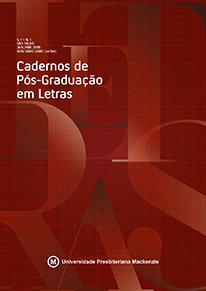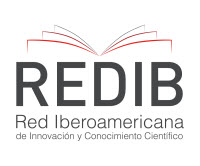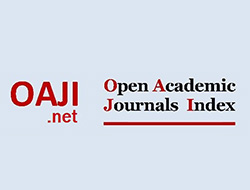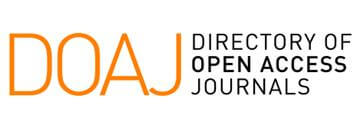Negotiation of cultural issues equated to nation in email exchanges
Téléchargements
Références
AGAR, M. Culture: Can You Take It Anywhere? Invited Lecture Presented at the Gevirtz Graduate School of Education, University of California at Santa Barbara. International Journal of Qualitative Methods 5 (2), 2006. Disponível em: <https://www.ualberta.ca/~iiqm/backissues/5_2/PDF/agar.pdf> Acesso em: 15 mai. 2016.
BAKER, W. Using e-Learning to Develop Intercultural Awareness in ELT: A Critical Evaluation in a Thai Higher Education Setting. British Council. London SW1A 2BN, UK, 2012.
BELZ, J.A. Social dimensions of telecollaborative foreign language study. Language
Learning & Technology 6 (1), 60-81, 2002. Disponível em: http://llt.msu.edu/vol6num1/belz/
Acesso em: 10 abr. 2016.
BELZ, 2003. From the special issue editor. Language learning and technology. Volume 7, n. 2. Pp. 2-4, 2003. Disponível em < http://llt.msu.edu/vol7num3/pdf/speced.pdf>. Acesso em fev. 2016.
BRAMMERTS, H. Autonomous language learning in tandem: The development of a concept. In: Tim Lewis & Lesley Walker (eds.). Autonomous Language Learning in Tandem. Sheffield: Academy Electronic Publications Limited, 2003.
BRAMMERTS, H. Tandem language learning via the internet and the International E-Mail Tandem Network. In.: LITTLE, D.; BRAMMERTS, H. (Ed.). A guide to language learning in tandem via the internet. CLCS Occasional Paper, n. 46, Dublin: Trinity College, Centre for Language and Communication Studies, p. 9-22, 1996. Disponível em: <http://www.eric.ed.gov/PDFS/ED399789.pdf>. Acesso em: 15 mai. 2016.
BYRAM, M. Teaching and assessing intercultural communicative competence. Clevedon: Multilíngual Matters, 1997.
_____. Teaching French and intercultural (communicative) competence. Francophonie 44(Autumn): 14-19, 2011.
BYRAM, M.; GRIBKOVA, B.; STARKEY, H. (2002). Developing the Intercultural Dimension in Language Teaching. A Practical Introduction for Teachers. Strasbourg: Council of Europe Publishing, Language Policy Division. . Disponível em: <http://www.coe.int/t/dg4/linguistic/Source/Guide_dimintercult_EN.pdf.> Acesso em: 14 mai. 2016.
COUNCIL OF EUROPE. Common European framework of reference for languages.
Cambridge: Cambridge University Press, 2001.
KERN, R., WARE, P; WARSCHAUER, M. Crossing frontiers: new directions in online pedagogy and research. Annual Review of Applied Linguistics, (24), p. 243–60, 2004.
KRAMSCH, C. Context and culture in language teaching. Oxford: Oxford University Press, 1993.
_____. The cultural component of language teaching. Zeitschrift für Interkulturellen Fremdsprachenunterricht [Online], 1(2), 13, 1996. Disponível em: http://www.spz.tu- darmstadt.de/projekt_ejournal/jg_01_2/beitrag/kramsch2.htm. Acesso em: 12 abr. 2016.
_____. Language and culture. Oxford: Oxford University Press.
Kramsch, C. (2005). Post 9/11: Foreign languages between knowledge and power. Applied Linguistics, 26(4), 545-567, 1998.
LEASK, B. Internationalizing the Curriculum. New York: Routledge, 2015.
LUNA, J.M.F. Internationalizing the Curriculum. Revista Brasileira de Educação (no prelo).
LIDDICOAT, A., SCARINO, A. Intercultural Language Teaching and Learning. Oxford: Wiley-Blackwell, p. 26, 2013.
LIDDICOAT, A. J., PAPADAMETRE, L., SCARINO, A., KOHLER, M. (2003). Report on intercultural language learning. Canberra: Department of Education, Science and Training, 2003.
KUMARAVADIVELU, B. Cultural Globalization and Language Education. Estados Unidos: Yale University, 2008.
O’DOWD, R. Understanding “the other side”: Intercultural learning in a Spanish–English e-mail exchange. Language Learning&Technology, 7, 118–144, 2003.
_____.The Use of Videoconferencing and E-mail as Mediators of Intercultural Student Ethnography. In: J.A Blez and S. Thorne (eds), Internet-mediated intercultural Foreign Language Education. Boston MA: Heinle and Heinle. (pp. 86-120), 2006.
_____. Telecollaboration and CALL. In: Contemporary Computer-Assisted Language. London/New York: Bloomsbury, 2013.
RISAGER, K. (2007). Language and Culture Pedagogy: From a National to a Transnational Paradigm (Vol. 14). Clevedon: Multilingual Matters, 2007
SAMOVAR, L. A.; PORTER, R. E. Communication between cultures. Belmont, CA: Thompson, 2004.
TAJFEL, H.; TURNER, J. C. An integrative theory of intergroup conflict. In: W. G. Austin & S. Worchel (Eds.), The social psychology of intergroup relations. 33, 47, 1979.
TELLA, S., MONONEN-AALTONEN, M. Developing dialogic communication culture in media education: Integrating dialogism and technology. Helsinki: Media Education Publications 7, 1998. Disponível em <http://www.helsinki.fi/~tella/mep7.html>. Acessado em 10 de mai. 2016.
TELLES, J. A.; VASSALLO, M. L. Foreign language learning in-tandem: Teletandem as an alternative proposal in CALLT. The ESPecialist, v. 27, v. 2 2006. Disponível em: <http://revistas.pucsp.br/index.php/esp/article/view/1629/1048>. Acessado em 14 mai. 2016.
THORNE, S. L. Pedagogical and Praxiological Lessons from Internet-Mediated Intercultural Foreign Language Education Research. In J. A. Belz & S. L. Thorne (eds.), Internet-Mediated Intercultural Foreign Language Education (pp. 2-30). Annual Volume of the American Association of University Supervisors and Coordinators. Boston, MA: Heinle & Heinle, 2006.
VASSALLO, M. L.; TELLES, J. A. Foreign language learning in-tandem: Theoretical principles and research perspectives. The ESPecialist, v. 27, p. 29-56, 2006. Disponível em: <http://revistas.pucsp.br/index.php/esp/article/view/6117>.
ZHU, J. Weaving language and culture together: the process of
culture learning in a Chinese as a foreign language classroom. 456 f.
Tese (Doutorado em Second Language Acquisiton), Graduate College of the University of Iowa, Iowa City, 2012.
Téléchargements
Publiée
Comment citer
Numéro
Rubrique
Licence
Os direitos autorais dos artigos publicados nos Cadernos de Pós-Graduação em Letras pertencem aos autores, que concedem à Universidade Presbiteriana Mackenzie os direitos exclusivos de publicação do conteúdo. É vedada sua reprodução total ou parcial sem a devida autorização da Comissão Editorial, exceto para estudo e pesquisa.











